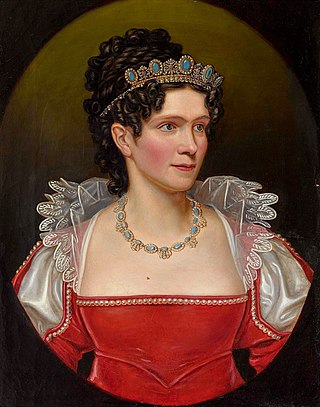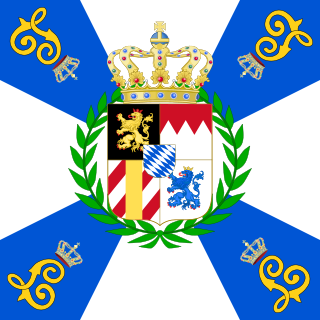
The prince-electors, pl. Kurfürsten, Czech: Kurfiřt, Latin: Princeps Elector) were the members of the electoral college that elected the ruler of the Holy Roman Empire.

The Electoral Palatinate or the Palatinate, officially the Electorate of the Palatinate, was a constituent state of the Holy Roman Empire. The electorate had its origins under the rulership of the Counts Palatine of Lotharingia in 915; it was then restructured under the Counts Palatine of the Rhine in 1085. From 1214 until the Electoral Palatinate was merged into the Kingdom of Bavaria in 1805, the House of Wittelsbach provided the Counts Palatine or Electors. These counts palatine of the Rhine would serve as prince-electors from "time immemorial", and were noted as such in a papal letter of 1261; they were confirmed as electors by the Golden Bull of 1356.

The House of Wittelsbach is a former Bavarian dynasty, with branches that have ruled over territories including the Electorate of Bavaria, the Electoral Palatinate, the Electorate of Cologne, Holland, Zeeland, Sweden, Denmark, Norway, Hungary, Bohemia, and Greece. Their ancestral lands of Bavaria and the Palatinate were prince-electorates, and the family had three of its members elected emperors and kings of the Holy Roman Empire. They ruled over the Kingdom of Bavaria which was created in 1805 and continued to exist until 1918.

The Palatinate, or the Rhenish Palatinate (Rheinpfalz), is a historical region of Germany. Prior to World War II, it was also referred to as Rhenish Bavaria; as a state of the Holy Roman Empire, it was known as the Lower Palatinate (Unterpfalz), which designated only the western part of the Electorate of the Palatinate, as opposed to the Upper Palatinate (Oberpfalz). It occupies roughly the southernmost quarter of the German federal state of Rhineland-Palatinate (Rheinland-Pfalz), covering an area of 2,105 square miles (5,450 km2) with about 1.4 million inhabitants. Its residents are known as Palatines (Pfälzer).
The history of Bavaria stretches from its earliest settlement and its formation as a stem duchy in the 6th century through its inclusion in the Holy Roman Empire to its status as an independent kingdom and finally as a large Bundesland (state) of the Federal Republic of Germany. Originally settled by Celtic peoples such as the Boii, by the 1st century BC it was eventually conquered and incorporated into the Roman Empire as the provinces of Raetia and Noricum.

Ludwig I or Louis I was King of Bavaria from 1825 until the 1848 revolutions in the German states. When he was crown prince, he was involved in the Napoleonic Wars. As king, he encouraged Bavaria's industrialization, initiating the Ludwig Canal between the rivers Main and the Danube. In 1835, the first German railway was constructed in his domain, between the cities of Fürth and Nuremberg, with his Bavaria joining the Zollverein economic union in 1834. After the July Revolution of 1830 in France, Ludwig's previous liberal policy became increasingly repressive; in 1844, Ludwig was confronted during the Beer riots in Bavaria. During the revolutions of 1848 the king faced increasing protests and demonstrations by students and the middle classes. On 20 March 1848, he abdicated in favour of his eldest son, Maximilian.

Maximilian I Joseph was Duke of Zweibrücken from 1795 to 1799, prince-elector of Bavaria from 1799 to 1806, then King of Bavaria from 1806 to 1825. He was a member of the House of Palatinate-Birkenfeld-Zweibrücken, a branch of the House of Wittelsbach.

Maximilian Karl Joseph Franz de Paula Hieronymus de Garnerin de la Thuile, Count von Montgelas was a Bavarian statesman, a member of a noble family from the Duchy of Savoy. His father John Sigmund Garnerin, Baron Montgelas, entered the military service of Maximilian III, Elector of Bavaria, and married the Countess Ursula von Trauner. Maximilian Josef, their eldest son, was born in the Bavarian capital Munich on September 10, 1759.

Ferdinand Maria was a Wittelsbach ruler of Bavaria and a prince-elector of the Holy Roman Empire from 1651 to 1679. The Elector modernized the army and introduced Bavaria's first government code. Besides encouraging agriculture and industry, he also improved building and restoration works on churches and monasteries since the damage caused during the Thirty Years' War.

The King of Bavaria was a title held by the hereditary Wittelsbach rulers of Bavaria in the state known as the Kingdom of Bavaria from 1805 until 1918, when the kingdom was abolished. It was the second time Bavaria was a kingdom, almost a thousand years after the short-lived Carolingian kingdom of Bavaria.

Maximilian III Joseph, "the much beloved", was a Prince-elector of the Holy Roman Empire and Duke of Bavaria from 1745 to 1777. He was the last of the Bavarian branch of the House of Wittelsbach and because of his death, the War of Bavarian Succession broke out.

Karl Theodor Anton Maria von Dalberg was a Catholic German bishop and statesman. In various capacities, he served as Prince-Archbishop of Regensburg, Arch-Chancellor of the Holy Roman Empire, Bishop of Constance and Worms, Prince-Primate of the Confederation of the Rhine and Grand Duke of Frankfurt. Dalberg was the last Archbishop-Elector of Mainz.

The Kingdom of Bavaria was a German state that succeeded the former Electorate of Bavaria in 1806 and continued to exist until 1918. With the unification of Germany into the German Empire in 1871, the kingdom became a federated state of the new empire and was second in size, power, and wealth only to the leading state, the Kingdom of Prussia.

The Grand Duchy of Berg, also known as the Grand Duchy of Berg and Cleves, was a territorial grand duchy established in 1806 by Napoleon after his victory at the Battle of Austerlitz (1805) on territories between the French Empire at the Rhine river and the German Kingdom of Westphalia.

The Electorate of Bavaria was a quasi-independent hereditary electorate of the Holy Roman Empire from 1623 to 1806, when it was succeeded by the Kingdom of Bavaria.

Caroline of Baden was by marriage an Electress of Bavaria and later the first Queen consort of Bavaria by marriage to Maximilian I Joseph of Bavaria.

Charles II August Christian was Duke of Zweibrücken from 1775 to 1795. A member of the Palatine House of Zweibrücken-Birkenfeld, a branch of the House of Wittelsbach, he was the elder brother of the first King of Bavaria, Maximilian I, and of Queen Amalia of Saxony.

The Bavarian Army was the army of the Electorate (1682–1806) and then Kingdom (1806–1918) of Bavaria. It existed from 1682 as the standing army of Bavaria until the merger of the military sovereignty of Bavaria into that of the German State in 1919. The Bavarian Army was never comparable to the armies of the Great Powers of the 19th century, but it did provide the Wittelsbach dynasty with sufficient scope of action, in the context of effective alliance politics, to transform Bavaria from a territorially-disjointed small state to the second-largest state of the German Empire after Prussia.

The Tyrolean Rebellion is a name given to the resistance of militiamen, peasants, craftsmen and other civilians of the County of Tyrol led by Andreas Hofer supported by his wife Anna and a strategic council consisting of Josef Speckbacher, Peter Mayr, Capuchin Father Joachim Haspinger, Major Martin Teimer and Kajetan Sveth, against new legislation and a compulsory vaccination programme concerning smallpox ordered by King Maximilian I of Bavaria, followed by the military occupation of their homeland by troops organised and financed by Napoleon I of the First French Empire and Maximilian I. The broader military context is called the War of the Fifth Coalition.

Bernhard Erasmus von Deroy from the Electorate of the Palatinate became a noted general officer in the army of Bavaria. His military career began shortly after the start of the Seven Years' War. During the French Revolutionary Wars he first served on the side of the Coalition against the French revolutionaries, then fought as an ally of the First French Empire during the Napoleonic Wars. Deroy and his colleague, Karl Philipp von Wrede, were dominant personalities in the Bavarian military during the era of Napoleon Bonaparte.


















